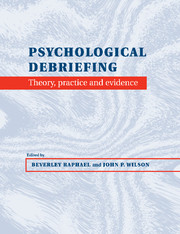Book contents
- Frontmatter
- Contents
- List of contributors
- Introduction and overview: Key issues in the conceptualization of debriefing
- Part I Key conceptual framework of debriefing
- Part II Debriefing: models, research and practice
- 5 Critical Incident Stress Management and Critical Incident Stress debriefings: evolutions, effects and outcomes
- 6 Debriefing with emergency services: Critical Incident Stress Management
- 7 Debriefing and body recovery: war grave soldiers
- 8 Debriefing and body recovery: police in a civilian disaster
- 9 Debriefing after massive road trauma: perceptions and outcomes
- 10 Debriefing and motor vehicle accidents: interventions and outcomes
- 11 Debriefing with service personnel in war and peace roles: experience and outcomes
- 12 Debriefing post disaster: follow-up after a major earthquake
- 13 Debriefing after disaster
- 14 Children and debriefing: theory, interventions and outcomes
- 15 Debriefing adolescents after critical life events
- Part III Adaptations of debriefing models
- Part IV Debriefing overview and future directions
- Conclusion: debriefing – science, belief and wisdom
- Index
7 - Debriefing and body recovery: war grave soldiers
from Part II - Debriefing: models, research and practice
Published online by Cambridge University Press: 06 January 2010
- Frontmatter
- Contents
- List of contributors
- Introduction and overview: Key issues in the conceptualization of debriefing
- Part I Key conceptual framework of debriefing
- Part II Debriefing: models, research and practice
- 5 Critical Incident Stress Management and Critical Incident Stress debriefings: evolutions, effects and outcomes
- 6 Debriefing with emergency services: Critical Incident Stress Management
- 7 Debriefing and body recovery: war grave soldiers
- 8 Debriefing and body recovery: police in a civilian disaster
- 9 Debriefing after massive road trauma: perceptions and outcomes
- 10 Debriefing and motor vehicle accidents: interventions and outcomes
- 11 Debriefing with service personnel in war and peace roles: experience and outcomes
- 12 Debriefing post disaster: follow-up after a major earthquake
- 13 Debriefing after disaster
- 14 Children and debriefing: theory, interventions and outcomes
- 15 Debriefing adolescents after critical life events
- Part III Adaptations of debriefing models
- Part IV Debriefing overview and future directions
- Conclusion: debriefing – science, belief and wisdom
- Index
Summary
EDITORIAL COMMENTS
Combat and its effects are well established as stressors, but the particular aspects of the roles of certain groups of soldiers need further research. This chapter reviews what is known about the psychological impact of body recovery, and in particular the possible effects on soldiers whose role it is to recover the bodies of colleagues or those of the enemy. Deahl's research and understanding of this field is clearly heightened by his own experience of body recovery after the Kings Cross Underground Wre in London. The special issues faced by soldiers who may recover bodies in situations of ongoing threat and factors that may mitigate the impact are the subject of this chapter.
A fortuitous naturalistic opportunity for research arose when two groups of soldiers could be compared: one had had debriefing; the other for operational reasons had not. The study found that debriefing did not mitigate the psychological distress experienced, which was very similar in the two groups. Factors that predicted ongoing distress included the degree of perceived threat experienced by the soldiers, and this was negatively correlated with previous ‘real-life experience’ of handling body remains. Past psychological problems also increased vulnerability, and only a small number had sought specialist help. Negative impact of this psychological morbidity on personal relationships was also found, indicating the significance of the morbidity described.
- Type
- Chapter
- Information
- Psychological DebriefingTheory, Practice and Evidence, pp. 108 - 117Publisher: Cambridge University PressPrint publication year: 2000
- 4
- Cited by

